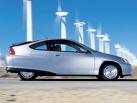Don’t Be Fooled by Bogus Renewable Energy Measures, Say California Conservation Groups
Props 10 Would Harm Clean Energy, Slow Fight Against Global Warming; Prop 1A would catalyze rail system; controversy about Prop 7.
A coalition of California’s leading conservation groups urge voters to cast "NO" votes against Propositions 7 and 10 on this November’s ballot.
The Natural Resources Defense Council (NRDC), California League of Conservation Voters (CLCV), Union of Concerned Scientists (UCS) and the Sierra Club, which for decades have led the fight to bring clean energy to California, warn the renewable energy measures are fatally flawed and, if passed, would harm the state’s efforts to create a clean energy economy.
"In a state where clean energy is as American as apple pie, we’re worried that voters could be confused by these misleading renewable energy measures," says David Pettit, director of NRDC’s Southern California Clean Air Program. "Props 7 and 10 sound good on paper, but they actually would make it harder to bring new wind and solar energy and clean vehicle technologies to California. We can’t afford to turn the clock back on clean energy."
Proposition 7, The Solar and Clean Energy Act of 2008, requires California to increase development of renewable energy, but is riddled with loopholes and would put in place complex regulatory barriers, making it harder for California to meet its renewable energy goals. The measure excludes small renewable energy providers from participating in California’s energy markets, slashes penalties by 80% for utilities that fail to achieve the state’s renewable energy targets, and would limit environmental review of renewable energy projects.
"Voters beware. This is definitely a case where the devil is in the details," says Dan Kalb, UCS California Policy Director. "The risk of global warming is too great to play around with poorly-drafted initiatives. That’s why it’s so important to get the solutions right. The loophole-ridden Prop 7 gets the solutions wrong, and worse yet it would lock in these problems because it would require a two-thirds vote of the Legislature to fix or amend the measure."
But some in the blogosphere disagree. There appears to be a great deal of controversy as to whether Proposition 7 is good or bad for clean energy. Some people accuse the NGOs of being in bed with the utilities. But the NGOs point out that businesses in the clean energy industry are also against the proposition.
NRDC says it prefers SB 411, which would raise the renewables target to 33%, but failed in the last legislative session. They believe the issues surrounding the bill have been resolved and expect the 33% standard to be signed into law in the next legislative session.
NRDC blog & comments.
[sorry this link is no longer available]
http://confusedinsolarcalifornia.blogspot.com
Proposition 10, California Alternative Fuels Initiative, would require $5 billion in public bond money to force creation of a market for natural gas as fuel for vehicles. Burning natural gas directly in cars and trucks is an inefficient way to use natural gas as a transportation fuel, according to the groups. A more efficient use for natural gas is to burn it to produce electricity that can then be used to charge plug-in hybrid electric vehicles. This fuel pathway is 40% more efficient.
"Proposition 10 promises little bang for five billion bucks," says Jim Metropulos, Sierra Club California’s Senior Advocate. "California cannot afford to waste money and time on technologies that won’t address global warming or promote clean air. We want to see much cleaner alternatives to the cars and trucks we’re driving now."
"The pro-renewable energy vote is ‘No on 7 and 10,’" says Anthony Rendon, interim executive director, CLCV. "California’s leading conservation groups are united in opposition to these bogus ballot measures."
Proposition 1A, High-Speed Rail Ballot Measure, is a clear winner on the Nov. 4 ballot, however. Proposition 1A would catalyze the development of a high-speed rail system and make improvements to existing rail networks. It provides $9.95 billion in bond funds to spur the development of an 800-mile high-speed rail system and improve existing rail networks.
++++
Learn more about the Propositions.
See the California League of Conservation Voters’ California Environmental Scorecard, which rates the actions of every state legislator and the Governor on the state’s environmental priorities each legislative year. http://www.ecovote.org/
